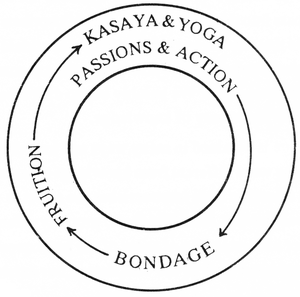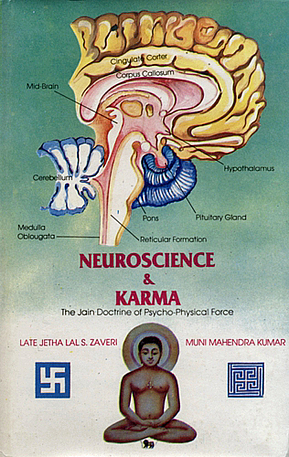Introductory:
Anyone who ventures to fathom and interpret the profound wisdom of the ancient Jain Philosophy, particularly in modern scientific terminology and methodology, must first humbly apologize, for his temerity to (i) those who really know because he may irritate them and (ii) those who do not know because he may mislead them. What then is the excuse for such a venture? It is our firm belief that what follows in this book will be found useful to (i) those inquisitive scientists who are impressed by the wisdom of the ancient seers and sages in the East and are anxious to augment the vistas of their knowledge and (ii) those inquisitive philosophers who believe that the facts proved by science may be able to pave the way for discovering more truths and knowledge.
A conservative/die-hard philosopher may at this point, question the locus standi of science to pronounce opinions on such subjects and thereby trespass into the field reserved, for philosophers and theologians. It may be held that those who study 'mere matter' should not dabble in the study of fundamentals but leave it to those who are concerned primarily with man and humanities. We humbly beg to differ from this view as it involves a false dichotomy of knowledge.
Knowledge is obtained in many ways and knowledge about human mind is in many ways different from knowledge about any other subject. But to reject scientific facts impoverishes the effort to research into the truth. We believe that scientific facts, properly interpreted, can help towards better understanding of some of the great questions. such as the relation of "body and soul' or the 'meaning of our existence'.
Modern advances in Biological Sciences such as endocrinology, physiology, neuropsychology and genetics explain how living organisms go about in pursuit of their particular aims. Doctrine of karman show why they do so. We believe that all that is necessary is that ancient knowledge and the interpretation of the ancient wisdom be expanded, translated and re-stated in terms that encompass discoveries of modern science.
We further believe that simultaneous discussion of the facts of science and wisdom of philosophy will help all of us to better understand both of them. While science, by itself may not be able to add fresh knowledge on the subject of karman, we are confident that scientific facts, if properly and systematically correlated with philosophy, are sure to enhance our understanding of the latter.
1. Cyclic Nature of Karman
The fundamental essence of the Jain doctrine of karman is based on the self-sufficiency and cyclic nature of the system; that is, the effect of the existing karman (karmaphala) becomes the cause of the new karman (karmabandha) and the vicious circle continues ad infinitum until one achieves emancipation, (see figure). As stated in "Doctrine of karman", the soul, pure in itself, has an innate ability to regain its pure state (Nirvana[1] i.e. emancipation) by demolishing the power of karman and

thus terminate the cycles of rebirth. An important facet of karmaphala (fruition of karman) is the bondage of new karman. The chief causative factors of the bondage are Kasāya[2] (which includes Nokasāya[3] and Yoga[4] and both factors are the result or effect of the fruition of the existing karman. While 'attitude and behavior1 are the ultimate effects of the past, it is also the cause of the new bondage. Behavior is constituted by threefold activitiesmental, vocal and muscular or thought, speech and bodily action. However, both speech and bodily actions are themselves regulated by thought (at least so far as humans are concerned). The speech is always preceded by thought and it is the human brain that produces language, love and aggression, pleasure and pain, happiness and grief, and much more positively come through the brain though not from it. We can thus study both the cause and the effect of karman by a critical study of (analyzing) how the brain works and controls the attitude and behavior of a person and regulates his life.
2. Neuroscience
Today several disciplines are involved in the study and research of Brain and its functions. Some of the prominent ones are:
· Anatomists who study pathways in the brain
· Physiologists who record and study its electrical responses
· Biochemists who investigate its endless chemical activities
· Clinical neurologists and neurosurgeons who tell us much about its health and disease
· Psychologists of various sorts who assess the performances, attitude and behavior of men and animals under different conditions.
· Psychiatrists who treat mental illnesses.
And the list is by no means complete. To organize the great mass of information that is being collected from experiments and observations by all these and other disciplines, the scientists agreed to give a name, a general label to the entire study and called it 'Neuroscience'.
Tremendous advances have been made in neuroscience in recent years and this new knowledge is used to make valuable statements about puzzling aspects of human behavior. Not only can it give new views of the problems raised by our habits, our work and play and our emotions and passions but also help with the study of philosophy (epistemology in particular), aesthetic appreciation, ethics and religion.
3. Brain Contains Knowledge
The basic fact about brain is that it contains knowledge and information written in its own language. Information in a living system is a feature of the arrangement of its parts which constitute a 'code' or language. To understand the language of the brain, we must learn to interpret the elements characters of the script in which it is written. Neuroscience is beginning to do this and in this book, we hope to show how the organization of the brain can be considered as the written script of the programs of our lives. So, the most important feature of the brain is not the material that it is made of but the information that it carries.
The neuroscience can translate the language of the brain into ordinary language and such knowledge of the brain enables us to expand our understanding of fundamental problems such as: why do people indulge in violence though they know that it is wrong to do so? Thus, we hope to show that study of the brain reveals patterns of information and action whose significance we can still perceive only dimly.
The analogy of sea-water defiled and polluted by various impurities and pure water obtained from it is useful to understand the nature and process of Nirvana in many respects. It is well-known that totally pure water, in large quantities, is produced by the process of distillation. Rain is also a natural process of distillation.
Basically it is possible to purify water because even in the polluted state of sea-water, it never surrenders its waterhood (i.e. atomic structure H20). Similarly the soul never loses its fundamental soulhood when defiled by another substance � - karmic matter. It would be noted that processes such as Alteration can remove undissolved impurities but distillation is necessary for removing dissolved pollutants. Similarly 'Nirvana' can be achieved only by a prescribed process of spiritual discipline.
 Prof. Muni Mahendra Kumar
Prof. Muni Mahendra Kumar

